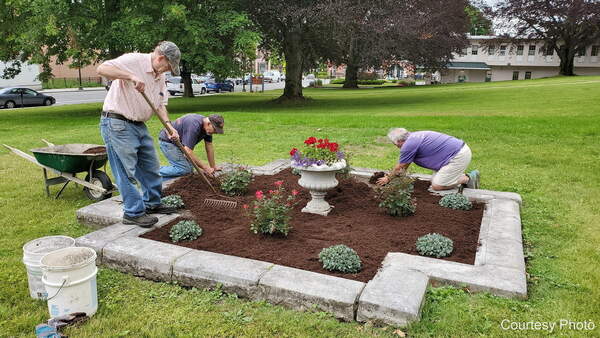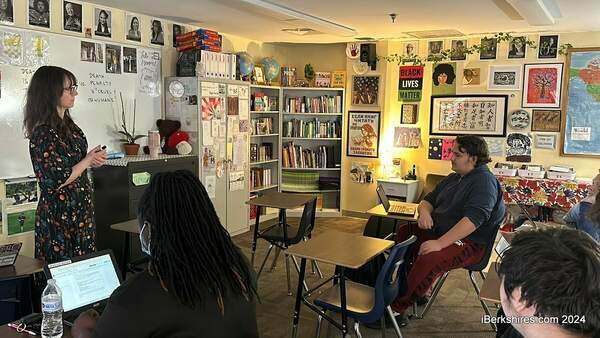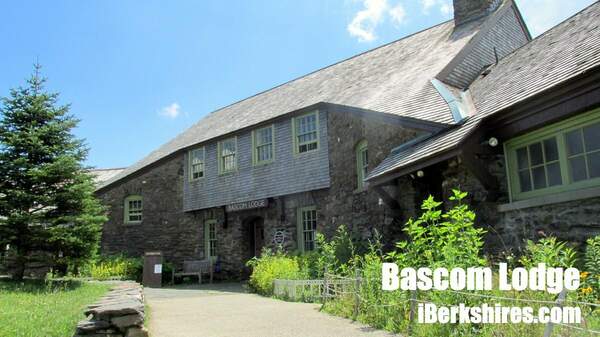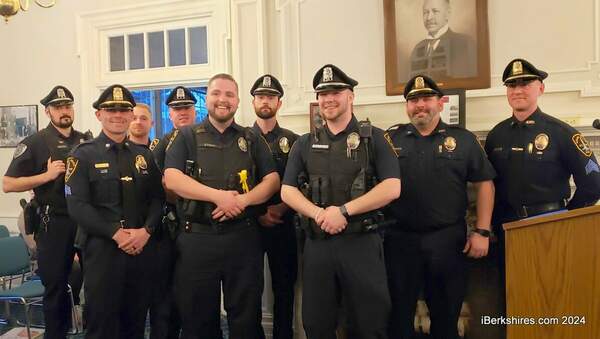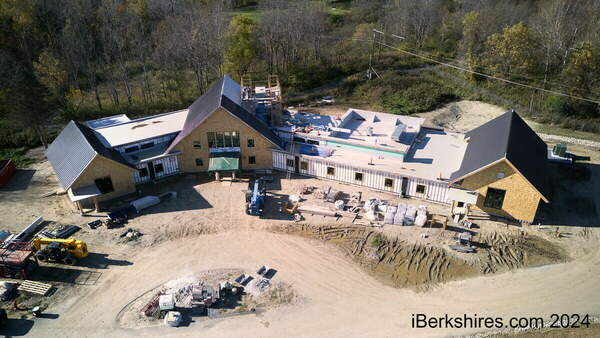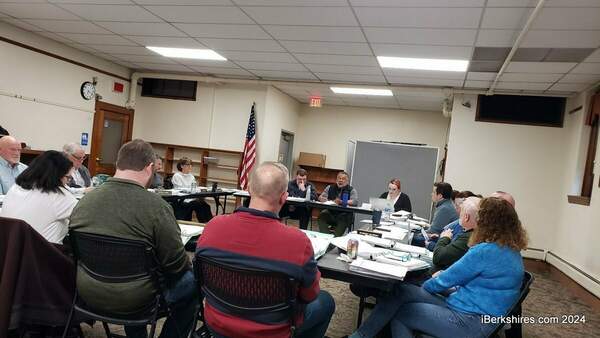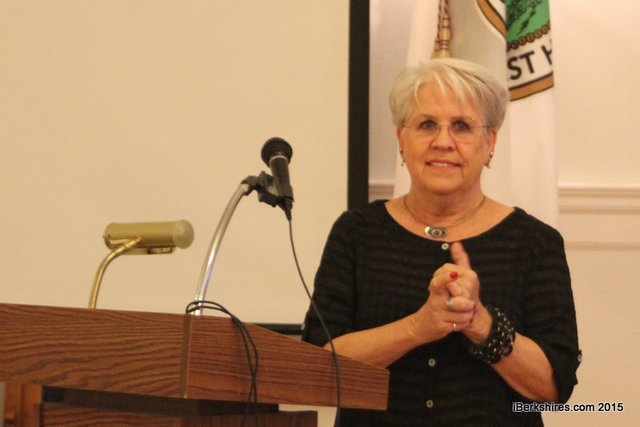
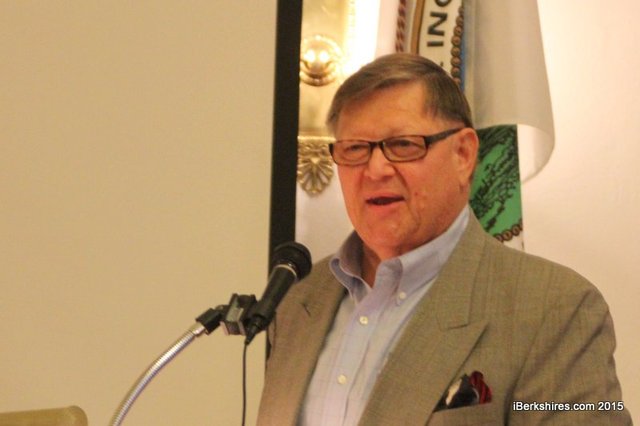
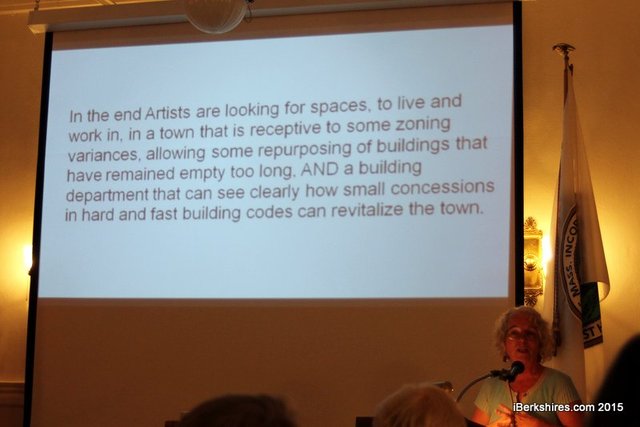
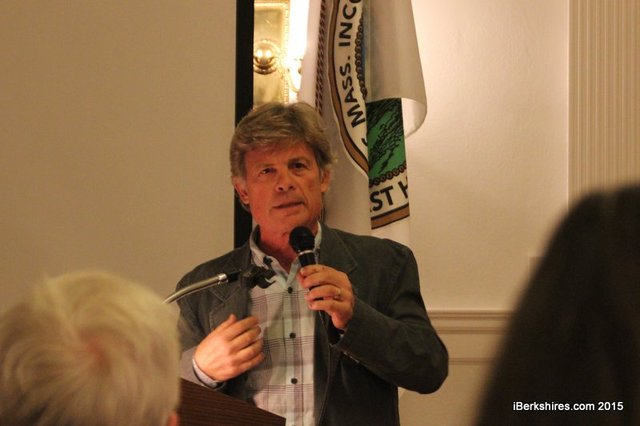
Adams Anthony Center Focuses on Creative Spaces
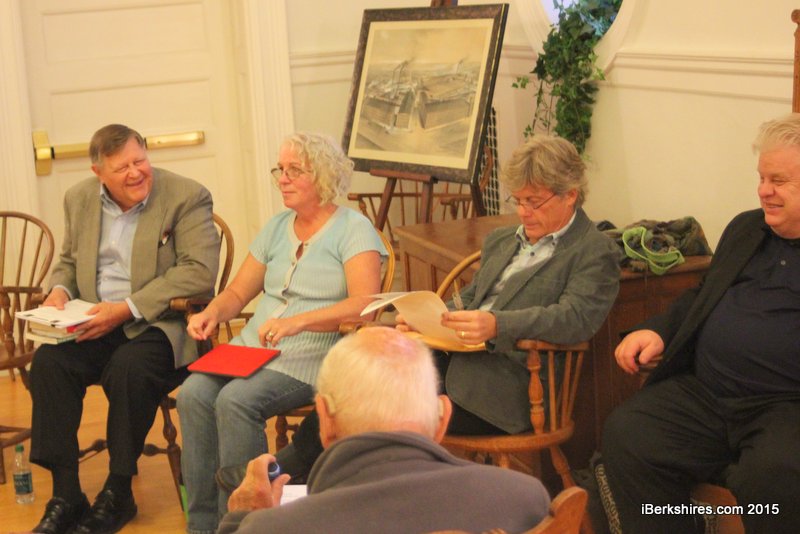 The Adams Anthony Center's most recent presentation focused on the development of live/work spaces for artists and other occupations. Speakers included Richard Tavelli, left, Francie Anne Riley, Eric Rudd and Bill Kolis. The Adams Anthony Center's most recent presentation focused on the development of live/work spaces for artists and other occupations. Speakers included Richard Tavelli, left, Francie Anne Riley, Eric Rudd and Bill Kolis. |
ADAMS, Mass. — A group working to stimulate growth in Adams is looking hard at zoning as a stumbling block to transforming the Mother Town.
Members of the Adams Anthony Center, founded by William Kolis, has been holding a series of discussions around the creative economy and participating in roundtables in Adams and elsewhere to promote ideas and problem solve. A top priority is making it easier for artists to redevelop older buildings for living and working.
"The biggest problems: code," Kolis told the gathering in the GAR Hall at the library on Tuesday night. "What we're facing here in this town is seen throughout the Berkshires.
"We can be the people that figure out how to get the projects done and that will turn the town around."
Kolis, an Adams native who returns to the town as much as possible by riding the rails from his law practice in Cleveland to Pittsfield, likes to use train metaphors. It takes tiny grains of sand to create enough traction for a locomotive's steel wheels to begin moving down the tracks, he said, and he believes he's seeing those little grains in several redevelopment projects now that are focused on live/work spaces.
That was the focus of Tuesday's meeting, which drew a couple dozen people to listen to ideas for refocusing toward art and recreation. Town Administrator Tony Mazzucco was out of town, but part of a interview he'd done with Kolis for Northern Berkshire Community Television was played. In it, Mazzucco said the town has "seen a uptick of artists moving into the community." He thought important to encourage that and to get artists involved in the community."
"A hundred years ago it was all live work," said speaker Eric Rudd, an artist probably best known locally for his redevelopment of the Eclipse Mill in North Adams to artist/studio condominiums.
As industry grew and population got denser, zoning was created to separate living and working areas, he said.
"We don't live in an industrial world anymore," argued Rudd. "We have clean industries ... the fear tactic, we've got to get rid of that. ... Make Adams the first live/work community in the United States."
He's positive pushing for live/work will offer a greater economic catalyst than continued wasted efforts to attract businesses. Most of the successes in growing manufacturing have been from companies and individuals already in the area, he said.
Live/work also shouldn't be targeted only on art, he said, but other occupations that can be done from the home like accounting, attorneys or programming.
Rudd also advocated for refocusing plans to develop the former Waverly Mill into low-income affordable housing into studio rentals or condos instead. He acknowledged that it low-income housing had fewer investment costs and greater access to grants, but felt the project would do nothing to spark economic growth. Rather, the "powers that be" should be working with banks to develop grants for creative opportunities.
He also offered up that the town should back off on the development of the Greylock Glen and leave it as a system of trails for recreation, and keep the development factor downtown. "Leave that poor mountain alone," he said. "It didn't do anything to you ... don't screw with what you have."
Speaker Richard Tavelli, a North Adams native whose background includes private equity and entrepreneurship, mined the research of Williams College professor Stephen Sheppard's report on the economic impact of non-profits three years ago to paint a picture of possiblilities.
"Very often the arts art thought of as an art museum or a gallery or in the context of the nonprofit.... that show you how strongly the arts are ... it is a very strong element.
Sheppard calculated arts and culture nonprofits generated some $164 million in economic impact in 2012. Those 73 identified organizations alone generated $83 million in revenue, expended $97 million and supported 2,900 jobs.
"Now that's not small potatoes in a county that has 132,000 people," he said. "And this group, interestingly enough, held $701 million in assets."
He pointed out that nearly million people attended the 14 largest venues, a number likely exceeded after two years of soaring attendance at the Clark Art Institute in Williamstown, including this year's record-breaking 170,000 in attendance.
The growth of the cultural economy, along with the area's natural beauty, is also creating to an attractive climate and quality of life for potential residents, he said.
"The small businesses, the entrepreneurs, the gallery owners ... They're taking these abandoned and unused properties and turning them into social venues that will generate economic activity," Tavelli said. "Studio, gallery owners are rehabbing buildings, setting down roots and that's going to be a major ongoing impact ...
"Economic development means a lot of approaches."
Those roots are being settled most immediately in several different mills and buildings, including Francie
Gail Kolis Sellers, local artist and business owner, also the evening's emcee, pointed to four buildings where new owners are putting down those roots, including the redevelopment of the Krutiak Mill on Grove Street by artists George E. Lemaitre and Patricia M. Fietta.
She'd met the former Nevada couple when they had entered her River Hill Pottery in the Eclipse Mill.
"They were on the Internet and looking for a good place for artists to be ... North Adams was listed as the No. 2 place for artists to settle because of the cost of living," Sellers said.
The couple were looking at an old mill but the owner never showed up; by happenstance, they met up with real estate agent who took them Adams. The old mill along the Ashuwillticook Rail Trail is now being rehabbed as live/work space for an expected opening in 2016.
The former Simmons Furniture store is also being transformed into a live/work space with a front gallery by owners Bill and Francie Anne Riley.
Francie Riley said she'd come to love the Berkshires when visiting here from New York with her husband, who parents had owned the furniture store for years. And she believes her friends and acquaintances in the art world would love it, too.
They've been transforming odd and old buildings into living spaces for years, she said, offering up a list of possible work/live prospects for artists who are looking for something more attuned to their needs than the usual three-bedroom Colonial.
"They homesteaded them up from nothing. ...
"I know they're not afraid of a little challenge that architecture can pose and every building in Adams could really be a live/work situation when you put the right minds to how you make it work."
Tags: adams anthony, artists studios, creative economy, economic development,

